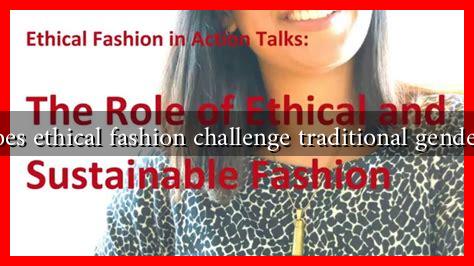-
Table of Contents
How Does Ethical Fashion Challenge Traditional Gender Roles?
In recent years, the fashion industry has witnessed a significant shift towards ethical practices, driven by consumer demand for sustainability, transparency, and social responsibility. This movement not only addresses environmental concerns but also challenges traditional gender roles, reshaping how we perceive fashion and identity. This article explores the intersection of ethical fashion and gender roles, highlighting how this paradigm shift is empowering individuals and promoting inclusivity.
The Intersection of Fashion and Gender
Fashion has long been a medium through which gender roles are expressed and reinforced. From the hyper-feminine styles often marketed to women to the rigidly masculine attire for men, traditional fashion narratives have perpetuated stereotypes. However, ethical fashion seeks to dismantle these narratives by promoting inclusivity and diversity. Here are some ways ethical fashion challenges traditional gender roles:
- Gender-Neutral Clothing: Many ethical fashion brands are embracing gender-neutral designs, allowing individuals to express themselves without the constraints of traditional gender norms. Brands like TomboyX and ASOS offer collections that cater to all genders, promoting the idea that clothing should not be confined to binary categories.
- Empowerment through Production: Ethical fashion often emphasizes fair labor practices, which can empower marginalized communities, including women. For instance, organizations like GlobalGiving support women artisans in developing countries, providing them with skills and financial independence, thus challenging the traditional roles that often confine women to domestic spheres.
- Redefining Masculinity: Ethical fashion brands are also redefining masculinity by promoting styles that encourage self-expression. Brands like Mr. Porter are showcasing men in diverse styles that break away from conventional masculinity, allowing men to explore their identities through fashion.
Case Studies: Brands Leading the Charge
Several brands are at the forefront of the ethical fashion movement, actively challenging traditional gender roles through their practices and messaging. Here are a few notable examples:
- Reformation: This brand is known for its sustainable practices and commitment to transparency. Reformation’s marketing campaigns often feature diverse models and promote body positivity, encouraging women to embrace their individuality rather than conforming to societal expectations.
- Patagonia: While primarily an outdoor clothing brand, Patagonia has made strides in promoting gender equality within its workforce and supply chain. Their initiatives include equal pay for women and support for female-led environmental organizations, challenging the notion that outdoor activities are solely for men.
- Wildfang: This brand specializes in gender-neutral clothing and aims to break down the barriers of traditional gender norms. Wildfang’s campaigns celebrate individuality and self-expression, encouraging customers to wear what makes them feel comfortable, regardless of societal expectations.
The Impact of Ethical Fashion on Society
The rise of ethical fashion is not just a trend; it represents a broader cultural shift towards inclusivity and social responsibility. By challenging traditional gender roles, ethical fashion is fostering a more equitable society. Some of the impacts include:
- Increased Awareness: Ethical fashion raises awareness about the social and environmental issues within the fashion industry, prompting consumers to make more informed choices.
- Community Building: Many ethical fashion brands prioritize community engagement, creating spaces for dialogue around gender and identity, which can lead to greater understanding and acceptance.
- Encouraging Self-Expression: By promoting diverse styles and gender-neutral options, ethical fashion encourages individuals to express their identities authentically, free from societal constraints.
Conclusion
Ethical fashion is more than just a response to environmental concerns; it is a powerful movement that challenges traditional gender roles and promotes inclusivity. By embracing gender-neutral designs, empowering marginalized communities, and redefining masculinity, ethical fashion is reshaping the narrative around identity and self-expression. As consumers continue to demand transparency and social responsibility, the fashion industry will likely evolve further, paving the way for a more equitable future. The journey towards ethical fashion is not just about clothing; it is about creating a world where everyone can express themselves freely and authentically.

